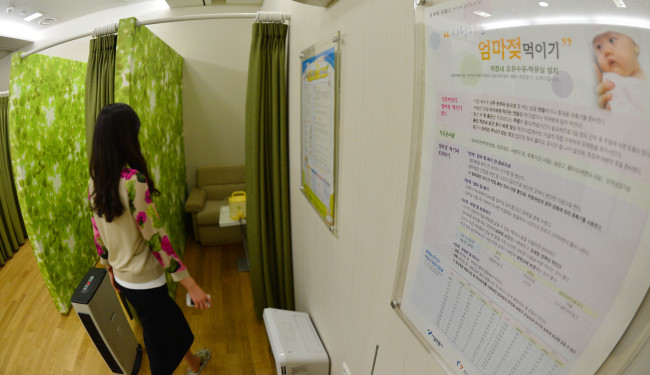What’s eating working moms?
Companies’ failure to live up to rules, stress over children’s education prompt women to quit work
By Korea HeraldPublished : April 16, 2013 - 19:58
Korea has one of the highest rates of college graduates in the world, with over 80 percent of high school graduates going to university. About half of them are women.
However, only 3 out of 5 female university graduates in the country are employed, showing the lowest rate among the 33 members of the Organization for Economic Cooperation and Development.
Economists worldwide including OECD Secretary-General Angel Gurria have pointed to the low participation of women in the labor force as a major risk to the Korean economy as its working-age population is set to decline from 2017.
Compared to other advanced economies, Korean women are more likely to quit their full-time jobs early in their careers or look for temporary or part-time jobs.
However, only 3 out of 5 female university graduates in the country are employed, showing the lowest rate among the 33 members of the Organization for Economic Cooperation and Development.
Economists worldwide including OECD Secretary-General Angel Gurria have pointed to the low participation of women in the labor force as a major risk to the Korean economy as its working-age population is set to decline from 2017.
Compared to other advanced economies, Korean women are more likely to quit their full-time jobs early in their careers or look for temporary or part-time jobs.

Why? Experts pick companies’ failure to live up to family-related law and Koreans’ high enthusiasm for their children’s education as the main reasons.
In a recent survey of 710 working moms by recruitment information provider Job Korea, 87 percent said they had thought about quitting when their kids fell sick (61.3 percent), when they found it difficult to manage children’s education (55.9 percent), couldn’t concentrate on work due to family issues (28 percent), or when their kids didn’t adjust well to school or childcare facilities (39.5 percent).
Preschool phase
A graph showing women’s participation in the labor force by age is shaped like the letter N, as a lot of women between their late 20s and late 30s quit upon marriage, pregnancy, childbirth or for their children’s education, according to Hong Seung-ah, chief of family policy at the Korean Women’s Development Institute.
“The Korean law guarantees 90 days’ paid maternity leave and up to a year of child care leave. But only about 60 percent of some 1,500 companies gave full 90-days’ maternity leave to employees giving birth last year,” Hong said.
At several large companies like POSCO, women who gave birth last year took an average child care leave of about eight months plus the three months’ paid maternity leave. But apparently, this was not the case at hundreds of smaller firms that employ many part-time and temporary workers.
“About half of the women who took maternity leaves went on child care leaves. Among the entire workforce who gave birth, the portion of women who took child care leaves is much smaller because over 40 percent of Korea’s female workers are non-regular employees.”

Moreover, putting toddlers in proper day care facilities is like winning the lottery. Mothers found nurseries run by workplaces the most satisfying, but only large companies and government agencies have those. Employees of smaller firms must be waitlisted for years to have their children admitted to day care centers run by district offices or reliable individuals. News reports about toddlers being hit for crying in private child care facilities are not uncommon.
Workplaces with more than 500 employees or more than 300 female workers are required by law to have nurseries or offer child care allowances to employees.
“Nearly 70 percent fulfill the requirement as the government discloses the list of businesses that don’t, such as some of the large hospitals,” Hong said.
“It costs the companies quite a lot to set up child care centers that meet all the safety standards, but increasing the number of nurseries at workplaces is the best way to keep mothers of preschool children in the labor force.”
School-age quandary
Despite the hardships, a majority of working moms manage to get through the preschool phase with help from their mothers, in-laws, nannies or nurseries that operate until dark, but many, especially college-educated or professional women, quit as their kids enter elementary school which finishes at 1 p.m.
Mothers say the social pressure surrounding children’s education makes them constantly feel sorry for not being full-time moms, who still appear to be the majority in many schools.
For one thing, public elementary schools in Korea ask parents to attend many events including mini-sports days, “open classes” where parents observe the lessons, lectures by the principal, parent-teacher meetings and parent assemblies.
“There is a school event that requires my attendance at least twice every month. I either have to take a half-day off or send my mother-in-law,” said Shin Sang-min, whose daughter entered elementary school last month.
“If I don’t go, I miss all the school-related information and the chance to get acquainted with the other parents. What bugs working moms the most is that it’s hard to get into parent groups that organize various private lessons after school such as soccer for boys and other sports for girls. Your child gets left out.”
When stay-at-home moms get to chat with each other as they wait to pick up the children at 1 p.m., Shin sends her daughter straight to after-school day care classes.
In a desperate attempt to do whatever she can, Shin joined the Green Mothers’ Club which meets nine times a year and helps children cross the streets, one of the many volunteer activities parents are asked to do at schools, including monitoring the meal service and serving as librarians.
“Sometimes I worry I might get fired for taking so many half-days off,” she said. “But I do it for the tea time the moms have afterward in order to bond and share information.”
Kim Seung-yeon, another mother of a first grader, is bothered by the Kakao Talk messages on her cell phone that keep ringing from morning to evening, but she can’t ignore them.
Mothers of her son’s classmates have a chat room on Kakao Talk where they share everything from the children’s homework to things they have to take to school and what happened in school that day. Kim may see over 200 messages in one day.
“I can’t even tell the other moms that I work because I’m afraid they will exclude me from the group. Sometimes I feel like I am a sinner for working,” she said.
When she goes home late at night, Kim is often baffled by the amount of homework her son is assigned with.
“The amount isn’t something a 6-year-old can do on his own. A parent’s help is a must almost every day. I had no choice but to wake up my kid and husband after midnight to finish the homework,” she said.
The optional but highly critical gatherings among parents of school-age children are a peculiar phenomenon seen only in Korea, but workplaces should be flexible enough to allow employees to take time off for their families without hurting their careers, according to Hong.
“Korea needs a more flexible corporate culture to offer more time off for family reasons,” she said.
“Sweden, for example, has what is called a ‘contact day’ on which parents can visit their children’s schools without having to use their personal holidays.”
By Kim So-hyun (sophie@heraldcorp.com)
-
Articles by Korea Herald



![[AtoZ Korean Mind] Does your job define who you are? Should it?](http://res.heraldm.com/phpwas/restmb_idxmake.php?idx=644&simg=/content/image/2024/05/06/20240506050099_0.jpg&u=)















![[K-pop's dilemma] Is Hybe-Ador conflict a case of growing pains?](http://res.heraldm.com/phpwas/restmb_idxmake.php?idx=642&simg=/content/image/2024/05/07/20240507050746_0.jpg&u=)